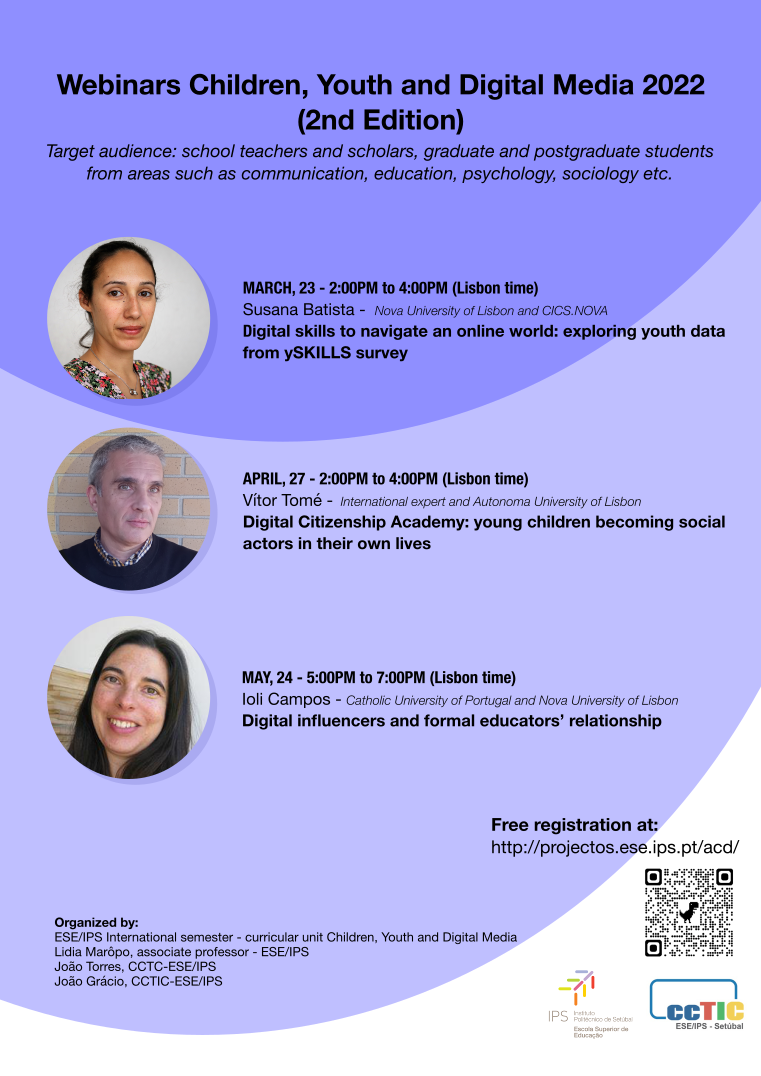Saltar para: Menu Principal, Conteúdo, Opções, Login. |

|
 |
Webinars Children, Youth and Digital Media | 2022Webinar International Semester | 2nd edition
Webinars Children, Youth and Digital Media 2022 Target audience: sschool teachers and scholars, graduate and postgraduate students from areas such as communication, education, psychology, sociology etc. Digital media shapes contemporary social life, influencing how children and young people learn, interact, and perceive themselves and one another. Children and youth are considered more vulnerable to risks and harm in the digital environment due to their presumed lack of cognitive, social, emotional, and physical maturity. However, as early and intense users of new technologies, they usually find new opportunities in engaging in the digital sphere, such as constructing identities, building social capital, learning technological skills, or engaging in civic movements. So, being active and participating in the digital world is a right of children and crucial to become participative citizens in our digital society. These webinars bring together some of the best experts in Portugal to debate central aspects of the relationship between children, youth, and digital media. Organized by: ESE/IPS International semester - curricular unit Children, Youth and Digital Media Lidia Marôpo, associate professor - ESE/IPS João Torres, CCTIC - ESE/IPS João Grácio, CCTIC - ESE/IPS Important information: Registration is free and mandatory at: http://projectos.ese.ips.pt/acd Instructions: 1. Create an account (click in 'criar conta') 2. Enter your details 3. Sign in the platform to choose the webinars you want to sign up for (click in 'clique para fazer a inscrição numa formação ou evento' at the top on the left) 4. Choose the webinars you want to sign up for (clik in 'inscrever' at the right side) 5. The links for the webinars will be sent by email after the registration. All the participants will receive a certificate. WEBINAR #1 MARCH, 23 - 2PM to 4PM (Lisbon Time) Digital skills to navigate an online world: exploring youth data from ySKILLS survey Speaker: Susana Batista is an Invited Assistant Professor at NOVA FCSH and researcher at CICS.NOVA (Centro Interdisciplinar de Ciências Sociais). She holds a Sociology PhD from ISCTE. She is involved in and has co-coordinated several national research projects in education, namely ESCXEL Project - School Network for Excellence. She is currently a researcher of the ySkills Project (Horizon 2020 project) and member of the EU Kids Online Portuguese team. She has research on public action in education, quantitative methods and youth and media. This presentation starts by considering the concept of digital skills, given its recognized importance in the ability of youth to take advantage of opportunities, deal with risks and participate online. Exploring recent data from ySKILLS project of children aged 13-17 years, we will then discuss the level and profile of digital skills and knowledge and its relation to activities performed online as well as the role of parents (and other educators) as mediators of digital technologies. Links: Projeto ySKILLS - https://yskills.eu/ EU Kids online -http://fabricadesites.fcsh.unl.pt/eukidsonline/ https://doi.org/10.7458/SPP20199112332 https://doi.org/10.7458/SPP20229820792 WEBINAR #2 APRIL, 27 - 2PM to 4PM (Lisbon Time) Digital Citizenship Academy: young children becoming social actors in their own lives Speaker: Vitor Tomé is an international expert on Digital Citizenship and Media Literacy (Council of Europe and European Commission), a lecturer (Autonoma University of Lisbon), an invited researcher (ISCTE-University Institute of Lisbon), a teacher trainer (Directorate-General of Education), and a freelance journalist (CP1524). Holds a PhD in Media Education and a post-doctorate in Communication Sciences, and is currently involved in several international and national reseach projets. This webinar gives an overview of the 'Digital Citizenship Academy' (2015 - ...; Lisbon outskirts, Portugal), an ongoing community-based research project whose main actors are preschool and primary school children. The more visible outputs (a school newspaper, either printed and online, a YouTube Channel and a sensible practice handbook) and the less visible ones (the intervention model that is being implemented, the teacher trainings' results and the crucial partnerships) will be discussed and shared as part of this webinar. Links: Digital Citizenship Academy -https://cuscojornal.wixsite.com/cusco YouTube channel - https://www.youtube.com/channel/UCZW7kz44f1x6WKH9AusjsbA Tomé, V., Lopes, P. Reis, B. & Dias, C.P. (2019). Active citizenship and participation through the media: a community project focused on pre-school and primary school children. Comunicação e Sociedade 36: 101-120. http://dx.doi.org/10.17231/comsoc.36(2019).2347 Tomé, V. (2021). Fazer o Mundo Inteiro: atividades de STEAM e Literacia dos Media do Pré-escolar ao Secundário. Lisboa: Ministério da Educação. https://cidadania.dge.mec.pt/sites/default/files/pdfs/fazer-o-mundo-inteiro.pdf WEBINAR #3 MAY, 24 - 5PM to 7PM (Lisbon Time) 'Digital influencers and formal educators' relationship Speaker: Ioli Campos is a guest assistant professor at the Catholic University of Portugal and at the Nova University of Lisbon. She has a PhD in Digital Media from the University of Texas at Austin Portugal Colab Program and a MA in journalism from Nova University of Lisbon. As a researcher, Campos has been focusing on journalism, media literacy, children and media. She has also been working as a consultant in those areas for international institutions, such as OSCE and the Council of Europe. Before that, Campos had worked as a journalist for 15 years for the national and foreign press. Over half of Portuguese children watch online videos every day (Smahel et al., 2020). Therefore, digital influencers have an important role in their lives. However, most schools still do not contemplate educative resources about this new reality. The project Influencers Trust Label (ITL) approached this new phenomenon by developing a trust label for influencers and a workshop for educators, among other activities. In this session, we will share some of the results of this project, which was carried out in three European countries, under the international coordination of ICMedia and with the funding for the European Commission, through the grant Media Literacy for All, throughout 2020 and 2021. Links: https://orcid.org/0000-0002-7504-3211 https://fch.lisboa.ucp.pt/pt-pt/pessoa/ioli-campos
|
|
|